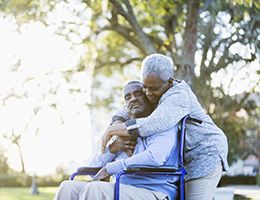Stroke: Coping with changes in emotions and behaviors

The effects of a stroke on your personality can be difficult to cope with, but in most cases they will get better.
If you've had a stroke, you may expect to experience some physical changes and limitations. But you also need to prepare for possible changes in your emotions and behaviors.
In addition to affecting how you move, a stroke can affect the way you think, act and feel. For example, a formerly easygoing person may become short-tempered, or a go-getter may lack motivation.
Of course, not everyone experiences the same changes from a stroke. But any changes in your personality can be difficult to cope with, both for you and for your loved ones.
However, it's important to remember that in most cases, stroke survivors can benefit from treatment.
How long it takes to recover and how much your condition improves depend on the severity of your stroke and how well you follow your rehabilitation program. It's important to be patient and give yourself time to get better.
Understanding a stroke
When you have a stroke, blood is cut off to part of your brain. How you're affected depends on the type of stroke you had, the area of your brain it damaged and the extent of the injury.
If the stroke affects the right side of your brain, you may develop paralysis on the left side of your body and you may have difficulty understanding facial expressions, according to the American Stroke Association (ASA).
If it takes place on the left side of your brain, you may develop paralysis on the right side of your body and you may have difficulty understanding speech.
Your doctor can help you better understand these changes.
Emotional and behavioral changes
While recovering from a stroke, don't be surprised if you find yourself experiencing changes in your emotions and the way you behave.
Many stroke survivors experience depression. Post-stroke depression may cause you to feel sad or irritable.
You might have trouble controlling your emotions. For example, you might cry or laugh at inappropriate times.
According to the ASA, if you've had a stroke you may:
- Become apathetic or not care what happens to you.
- Lack motivation.
- Tire easily.
- Get frustrated or angry more easily than before the stroke.
- Have trouble communicating with others or understanding visual cues or body language.
- Act impulsively.
It's also common for stroke survivors to ignore the damage caused by a stroke and deny that their behavior has changed.
Coping with stroke-related changes
Recovering from a stroke can be a difficult process. But there are steps you can take to make it easier. The ASA and other experts offer this advice:
Seek support. Meeting regularly with other survivors can help you learn more about stroke, cope with the changes it has caused and realize you are not alone. Your doctor can refer you to a support program.
Try rehabilitation. Look into stroke rehab programs, which can help you improve your physical abilities and learn new skills and coping techniques.
Treat depression. Get help for depression right away. Leaving it untreated can interfere with your recovery.
And remember—be patient. It can take years to recover lost abilities.
Reviewed 11/21/2024
